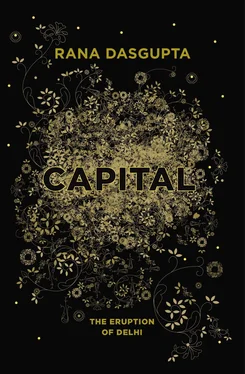“But now, with the rise of China, we have stopped producing anything. My father closed down our production and now we only sell other people’s products. German, American and Chinese. My grandfather still runs a stethoscope factory, even though it makes losses, because he likes it. Even though he’s old and he doesn’t need to, he goes there every day because he is passionate about making stuff. I’ve never really seen anyone from my father’s generation get passionate. They’re happy but they have no ambition. They have their parties, they marry their kids into fancy families — they’re all happy. Too happy. Each of them owns a big company, they sell products that cannot be matched and do not need marketing. One of my aunts owns the India monopoly for Nikon cameras. Money just keeps piling up without anyone doing anything.”
Rahul studied at an Ivy League school in the US. In many ways he felt more at home there than here, and wondered for a while whether he should return. But his father wanted him to take over a chunk of the company, and at length he decided to take the plunge.
“Of course I thought about whether I should do something else. Sometimes, running this company, I just feel like I’ll die. But there are compromises in every kind of life. And I thought: how many people get an opportunity like this? I could have got a job in the US, and now I might be some analyst trying to help a supermarket save 1 per cent of its costs. Then I would be only a part of the machine. But I want to be the machine. Or: I want to control the machine.
“My friends at college were mostly artistically inclined. What I will do by the time I’m thirty will be much, much more than what they will do. Business, money — it’s all just a means to an end. I want to have a legacy. That’s what I’m trying to say. I don’t want to die without a legacy.”
We talk about business strategy. He is undertaking a total overhaul of the company, extending its scope up- and downstream. Right now he is launching a chain of speciality hospitals, using tracts of land acquired by the family decades ago. Ultimately, it will be an international chain. After that he wants to invest in medical research and development, and perhaps acquire a foreign medical instruments manufacturer, so that the company can produce original products of its own and not just sell other people’s. He speculates about new investments even as he’s talking.
“That may not be the right thing to do. But that’s how I’m thinking. I often get ahead of myself. There’s no point in doing this unless you are playing at the level of the people at the top. So you have to think all the time.”
His knee pumps up and down as he talks: there is enormous nervous energy about him. It comes partly from the fact that he is taking big risks within the family.
“In Punjabi business families it’s very difficult to change direction because the family is risk-averse. You carry on doing what you know. You do the thing that is in your blood. For the old business there are thirty people I can ask for advice, but with these new ventures I have to start from scratch. But that’s how I’m different from most of them. Most of them will never do anything significant because personal gain means too much to them. They’re not willing to think far enough. Of course Indian businessmen have to continue their business tradition, and there’s no question that out of ten businesspeople, three or four will definitely go far compared to their US or European counterparts because of the way that our families and society are structured. But if they’re going to do something really great, they have to break out of their conservatism.”
In order to do all this, Rahul has departed significantly from the traditional family ethic, again, by raising external financing. In this he is typical of his liberalisation generation, which holds a profoundly changed conception of money. Before that, money — ‘dhan’, or wealth — was static. It was symbolised in gold, and it was kept locked up. It was not gambled, spent, or invested in uncertain schemes. It could not grow but it could easily shrink, and so every expenditure, no matter how small, was a loss of potential. Punjabis fought over one rupee and 1 million rupees with the same fervour, for other people’s profit was their loss. But with the era of markets, money has ceased to be tangible and static. It has become abstract and dynamic. Putting money out no longer leads, automatically, to loss: not doing so, in fact, is to lose out on the benefits of money’s expanding universe. Suddenly, money breeds money, which is one of the reasons that the younger generations of north Indian families have suddenly lost their anxiety about buying stuff. There is always more money where that came from.
“What I will eventually do is demerge these companies and run them like a venture capitalist, investing capital as they need. Eventually I’ll take some of them public. It’s great to have a tightly held group but I’d rather have 40 per cent of 10,000 crores [$2 billion] than 100 per cent of 500 crores [$100 million].
“Let me tell you, this is not easy. I’ve just come back from financing meetings in London. It’s very challenging to get investment from fifty-year-old guys when I’m so inexperienced. This project is turning all my hair grey. It’s making me old.”
“You look like a kid.”
“How old do I look?”
“About twenty-one.”
“Oh thank you. I feel like I look fifty years old. I feel like I am fifty. I was looking in the mirror this morning, and I thought I was going bald.”
It’s as if Rahul feels he has made a Faustian bargain with his family firm. It will suck out all his youth and energy, and he will be condemned to a lifetime of looking with horror in the mirror. But, as he immediately says, in words that could have come directly from Goethe’s play, it will give him enormous productive power:
“When I go there and see the huge piles of mud and the huge excavations where they’re building the new hospital, it’s so thrilling. If I can make this thing work, the satisfaction will be unmatched .”
Those huge piles of mud, those excavations: these are the images that circulate in magazines as the horror of ruthless, relentless capital, constantly tearing down what exists in order to accumulate anew: more, bigger, further, quicker. But Rahul looks out on the gouged earth and sees himself completed, expanded, raised up.
“Sometimes I feel like I am just drowning. I am sinking and drowning. But sometimes I’m like, Wow .”
I ask him why he needs to live life so dangerously. He becomes melancholic about the history of the family firm. It was split up among the men of his father’s generation in ways he finds unjust.
“I should have been running a much larger group. When I think about that it pinches a little bit. So some of my motivation comes from wanting to compensate for the losses of the past. Crucial chunks were lost to us, and that burns.”
“Being gay must affect your outlook too?”
“Well, that’s another thing that motivates me to be better than everyone else. I am better than everyone else. I know it sounds conceited. And part of the reason is that I have to perform in order to defy all stereotypes — so they can never say, ‘He’s not really a man.’ I’m not one of those burly Punjabis, so I have to prove myself.”
In fact Rahul has all the qualities of the quintessential Punjabi businessman: a sense of historical slight, a struggle against the world, infinite ground to make up. It makes for his nervous energy, his impatience, his great ambition.
“You talked about a legacy. What is a legacy?”
“I mean, you can set up a school where they educate a hundred kids. You can give money to a charitable organisation. Those may be good things to do. But that is not a legacy. In the broad scheme of things it’s so small that it’s completely irrelevant. Have you seen what the Rockefellers did? That’s a legacy. Every college and university in the US has something that the Rockefellers gave. Every person in that country is somehow touched by what they did. That’s a fucking legacy.
Читать дальше











